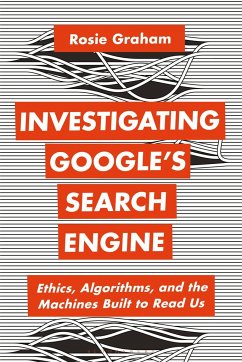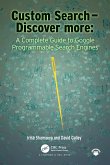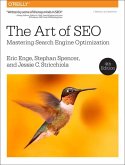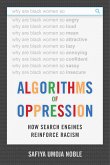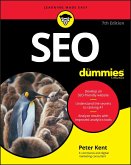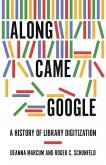Rosie GrahamEthics, Algorithms, and the Machines Built to Read Us
Investigating Google's Search Engine
Ethics, Algorithms, and the Machines Built to Read Us
Herausgeber: Mandal, Anthony; Kidd, Jenny
Rosie GrahamEthics, Algorithms, and the Machines Built to Read Us
Investigating Google's Search Engine
Ethics, Algorithms, and the Machines Built to Read Us
Herausgeber: Mandal, Anthony; Kidd, Jenny
- Broschiertes Buch
- Merkliste
- Auf die Merkliste
- Bewerten Bewerten
- Teilen
- Produkt teilen
- Produkterinnerung
- Produkterinnerung
What do search engines do? And what should they do? These questions seem relatively simple but are actually urgent social and ethical issues. The influence of Google's search engine is enormous. It does not only shape how Internet users find pages on the World Wide Web, but how we think as individuals, how we collectively remember the past, and how we communicate with one another. This book explores the impact of search engines within contemporary digital culture, focusing on the social, cultural, and philosophical influence of Google. Using case studies like Google's role in the rise of fake…mehr
Andere Kunden interessierten sich auch für
![Custom Search - Discover more Custom Search - Discover more]() Irina ShamaevaCustom Search - Discover more64,99 €
Irina ShamaevaCustom Search - Discover more64,99 €![The Art of SEO The Art of SEO]() Stephan SpencerThe Art of SEO45,99 €
Stephan SpencerThe Art of SEO45,99 €![Information Architecture Information Architecture]() Louis RosenfeldInformation Architecture62,99 €
Louis RosenfeldInformation Architecture62,99 €![Algorithms of Oppression Algorithms of Oppression]() Safiya Umoja NobleAlgorithms of Oppression23,99 €
Safiya Umoja NobleAlgorithms of Oppression23,99 €![SEO for Dummies SEO for Dummies]() Peter Kent (Consultant)SEO for Dummies34,99 €
Peter Kent (Consultant)SEO for Dummies34,99 €![Along Came Google Along Came Google]() Deanna MarcumAlong Came Google29,99 €
Deanna MarcumAlong Came Google29,99 €![Verified Verified]() Mike CaulfieldVerified11,99 €
Mike CaulfieldVerified11,99 €-
-
-
What do search engines do? And what should they do? These questions seem relatively simple but are actually urgent social and ethical issues. The influence of Google's search engine is enormous. It does not only shape how Internet users find pages on the World Wide Web, but how we think as individuals, how we collectively remember the past, and how we communicate with one another. This book explores the impact of search engines within contemporary digital culture, focusing on the social, cultural, and philosophical influence of Google. Using case studies like Google's role in the rise of fake news, instances of sexist and misogynistic Autocomplete suggestions, and search queries relating to LGBTQ+ values, it offers original evidence to intervene practically in existing debates. It also addresses other understudied aspects of Google's influence, including the profound implications of its revenue generation for wider society. In doing this, this important book helps to evaluate the real cost of search engines on an individual and global scale.
Produktdetails
- Produktdetails
- Bloomsbury Studies in Digital Cultures
- Verlag: Bloomsbury Publishing PLC
- Seitenzahl: 256
- Erscheinungstermin: 12. Januar 2023
- Englisch
- Abmessung: 231mm x 154mm x 15mm
- Gewicht: 402g
- ISBN-13: 9781350325197
- ISBN-10: 1350325198
- Artikelnr.: 63762857
- Herstellerkennzeichnung
- Libri GmbH
- Europaallee 1
- 36244 Bad Hersfeld
- gpsr@libri.de
- Bloomsbury Studies in Digital Cultures
- Verlag: Bloomsbury Publishing PLC
- Seitenzahl: 256
- Erscheinungstermin: 12. Januar 2023
- Englisch
- Abmessung: 231mm x 154mm x 15mm
- Gewicht: 402g
- ISBN-13: 9781350325197
- ISBN-10: 1350325198
- Artikelnr.: 63762857
- Herstellerkennzeichnung
- Libri GmbH
- Europaallee 1
- 36244 Bad Hersfeld
- gpsr@libri.de
Rosie Graham is Lecturer in Contemporary Literature and the Digital at the University of Birmingham, UK and co-director of its Digital Cultures Research Centre.
Introduction: Investigating Google's Search Engine
1.0 Google's Dominance
2.0 The Three Steps of How Search Engines Work: Crawling, Ranking, and
Query Results
1.1 Step One: Crawling
1.2. Step Two: Ranking
1.3 Step Three: Query Results
3.0 Five Key Challenges of Studying Google's Search Engine
3.1: Multiple Actors: Search Engine Optimisation and Economic Incentives
3.2: Moving Targets
3.3: Each Search a Partial Viewpoint
3.4: No Real Alternatives
3.5: The Myth of Black Boxes
4.0 Chapter Outlines
5.0 Notation and Examples
Chapter One:
Understanding Google Queries and the Problem of Intentions
Introduction
1.0 Categorising How and What People Search
1.1 The Roles of Search Engines and Information Retrieval's Question of
Why
1.2 Query Length and the Problems of Intention
1.3 All Information is Ethical: Searching for [food for snakes]
2.0 Predicting Intentions with a Lack of Information: Plato, Gadamer, and
Derrida
2.1 Gadamer's Hermeneutics and Plato's Fears of Deception
2.2 Google's Algorithms and Derrida's Monster
3.0 What Kinds of Things Do People Search Google For?
3.1 Google Trends, Brexit, and "Frantically" Googling after the EU
Referendum
Conclusion
Chapter Two:
Google's Impact on Cognition and Memory: Histories, Concepts, and
Technosocial Practices
Introduction
1.0 Google's Impact on the Cognition and Memory
1.1 Metaphors of Recall from Extended Minds to Transactive Memory
2.0 Technosocial Memory Practices from Oral Culture to Digital Literacy
3.0 The Legacy of Naturalised Technologies
3.1 Truth and Knowledge for Plato
3.2 Aristotle's Sensory Approach
4.0 Technosocial Memory Before Google: The Ars Memoria
4.1 The Science and Magic of Search
5.0 Treating the Mind as Technology: Bacon, Hooke, and Modern Psychology
Conclusion
Chapter Three:
Autocomplete: Stereotypes, Biases, and Designed Discrimination
Introduction
1.0 The Desire for a Digital Oracle
1.1 Autocomplete's Minimal Academic Attention
2.0 The Biases of Autocomplete: Stereotypes and Discrimination
3.0 Predicting and Shaping User Attitudes: The Origins of Autocomplete
3.1 So, How Does Autocomplete Operate?
4.0 Second-Order Stereotyping: Sexist Suggestions for Female Scientists
4.1 RankBrain and the Biases of Machine Learning
4.2 Automated Misogyny for Every Individual
5.0 Speed
5.1 Speed and Judgment: Time to Reflect
Conclusion
Chapter Four:
Google's Search Engine Results: What is a Relevant Result?
Introduction
1.0 "Quantifiable Signals" and Malawian Witch Doctors
2.0 What Should Search Engine Results Be?
2.1 The Idealists: Search Is Democratic, Relevance Can Be Measured
Objectively, and Answers Can Exist Independently of Bias
2.2 The Difficulty with Measuring Relevance
2.3 The Contextualists: Search Is Undemocratic, Relevance Is a Measure of
Personalisation, and All Answers Are Inherently Biased
2.4 Are Search Results Personalised?
3.0 Methodological Challenges of Studying Search Engines
3.1 Particular Considerations for Collecting Search Engine Results
4.0 Variables that Matter: Search Experiments in 2015, 2017, and 2021
4.1 The Rationale Behind Focusing on Same-Sex Sexual Orientation
4.2 Queries Used
4.3 Capturing the Spread of Results from the First Page
4.4 Evaluation Method
5.0 Google's Public Position on How They Provide Results
6.0 The Importance of Language and Location in Search Results (2015)
6.1 How Do Variations in Terminology and Phrasing Alter Search Results?
6.2 Unimaginable Communities
7.0 How Search Results Change Throughout Time: 2015, 2017, 2021
7.1 Longitudinal Overview: Official Languages in Each Domain
7.2 Terminology Throughout Time: "Homosexual" vs. "Gay"
6.3 Phrasing Throughout Time: "Good" vs. "Wrong"
Conclusion
Chapter Five:
The Real Cost of Search Engines: Digital Advertising, Linguistic
Capitalism, and the Rise of Fake News
Introduction
1.0 The Economics of Google
2.0 The Context of Post-Fordism
3.0 AdWords: Organic vs. Sponsored Results
3.1 AdWords: The Multilingual Linguistic Market and an Economy of Bias
3.2 Google's Institutionalisation, Data-Collection, and Advertising
3.3 AdWords in the Context of "The Magic System"
3.4 AdWords and the General Intellect
4.0 The Economic Profits of Discrimination
5.0 Private Profits and Public Loses
5.1 Google's International Expansion
6.0 AdSense and Post-Fordism: The Cost of Google's Billboards
6.1 AdSense and Fake News in the 2016 US Presidential Election
6.2 The Reciprocal Relationship Between AdSense and Facebook
Conclusion
Conclusion: What if Search Engines Were Actually Built to Benefit Users?
1.0 Google's Dominance
2.0 The Three Steps of How Search Engines Work: Crawling, Ranking, and
Query Results
1.1 Step One: Crawling
1.2. Step Two: Ranking
1.3 Step Three: Query Results
3.0 Five Key Challenges of Studying Google's Search Engine
3.1: Multiple Actors: Search Engine Optimisation and Economic Incentives
3.2: Moving Targets
3.3: Each Search a Partial Viewpoint
3.4: No Real Alternatives
3.5: The Myth of Black Boxes
4.0 Chapter Outlines
5.0 Notation and Examples
Chapter One:
Understanding Google Queries and the Problem of Intentions
Introduction
1.0 Categorising How and What People Search
1.1 The Roles of Search Engines and Information Retrieval's Question of
Why
1.2 Query Length and the Problems of Intention
1.3 All Information is Ethical: Searching for [food for snakes]
2.0 Predicting Intentions with a Lack of Information: Plato, Gadamer, and
Derrida
2.1 Gadamer's Hermeneutics and Plato's Fears of Deception
2.2 Google's Algorithms and Derrida's Monster
3.0 What Kinds of Things Do People Search Google For?
3.1 Google Trends, Brexit, and "Frantically" Googling after the EU
Referendum
Conclusion
Chapter Two:
Google's Impact on Cognition and Memory: Histories, Concepts, and
Technosocial Practices
Introduction
1.0 Google's Impact on the Cognition and Memory
1.1 Metaphors of Recall from Extended Minds to Transactive Memory
2.0 Technosocial Memory Practices from Oral Culture to Digital Literacy
3.0 The Legacy of Naturalised Technologies
3.1 Truth and Knowledge for Plato
3.2 Aristotle's Sensory Approach
4.0 Technosocial Memory Before Google: The Ars Memoria
4.1 The Science and Magic of Search
5.0 Treating the Mind as Technology: Bacon, Hooke, and Modern Psychology
Conclusion
Chapter Three:
Autocomplete: Stereotypes, Biases, and Designed Discrimination
Introduction
1.0 The Desire for a Digital Oracle
1.1 Autocomplete's Minimal Academic Attention
2.0 The Biases of Autocomplete: Stereotypes and Discrimination
3.0 Predicting and Shaping User Attitudes: The Origins of Autocomplete
3.1 So, How Does Autocomplete Operate?
4.0 Second-Order Stereotyping: Sexist Suggestions for Female Scientists
4.1 RankBrain and the Biases of Machine Learning
4.2 Automated Misogyny for Every Individual
5.0 Speed
5.1 Speed and Judgment: Time to Reflect
Conclusion
Chapter Four:
Google's Search Engine Results: What is a Relevant Result?
Introduction
1.0 "Quantifiable Signals" and Malawian Witch Doctors
2.0 What Should Search Engine Results Be?
2.1 The Idealists: Search Is Democratic, Relevance Can Be Measured
Objectively, and Answers Can Exist Independently of Bias
2.2 The Difficulty with Measuring Relevance
2.3 The Contextualists: Search Is Undemocratic, Relevance Is a Measure of
Personalisation, and All Answers Are Inherently Biased
2.4 Are Search Results Personalised?
3.0 Methodological Challenges of Studying Search Engines
3.1 Particular Considerations for Collecting Search Engine Results
4.0 Variables that Matter: Search Experiments in 2015, 2017, and 2021
4.1 The Rationale Behind Focusing on Same-Sex Sexual Orientation
4.2 Queries Used
4.3 Capturing the Spread of Results from the First Page
4.4 Evaluation Method
5.0 Google's Public Position on How They Provide Results
6.0 The Importance of Language and Location in Search Results (2015)
6.1 How Do Variations in Terminology and Phrasing Alter Search Results?
6.2 Unimaginable Communities
7.0 How Search Results Change Throughout Time: 2015, 2017, 2021
7.1 Longitudinal Overview: Official Languages in Each Domain
7.2 Terminology Throughout Time: "Homosexual" vs. "Gay"
6.3 Phrasing Throughout Time: "Good" vs. "Wrong"
Conclusion
Chapter Five:
The Real Cost of Search Engines: Digital Advertising, Linguistic
Capitalism, and the Rise of Fake News
Introduction
1.0 The Economics of Google
2.0 The Context of Post-Fordism
3.0 AdWords: Organic vs. Sponsored Results
3.1 AdWords: The Multilingual Linguistic Market and an Economy of Bias
3.2 Google's Institutionalisation, Data-Collection, and Advertising
3.3 AdWords in the Context of "The Magic System"
3.4 AdWords and the General Intellect
4.0 The Economic Profits of Discrimination
5.0 Private Profits and Public Loses
5.1 Google's International Expansion
6.0 AdSense and Post-Fordism: The Cost of Google's Billboards
6.1 AdSense and Fake News in the 2016 US Presidential Election
6.2 The Reciprocal Relationship Between AdSense and Facebook
Conclusion
Conclusion: What if Search Engines Were Actually Built to Benefit Users?
Introduction: Investigating Google's Search Engine
1.0 Google's Dominance
2.0 The Three Steps of How Search Engines Work: Crawling, Ranking, and
Query Results
1.1 Step One: Crawling
1.2. Step Two: Ranking
1.3 Step Three: Query Results
3.0 Five Key Challenges of Studying Google's Search Engine
3.1: Multiple Actors: Search Engine Optimisation and Economic Incentives
3.2: Moving Targets
3.3: Each Search a Partial Viewpoint
3.4: No Real Alternatives
3.5: The Myth of Black Boxes
4.0 Chapter Outlines
5.0 Notation and Examples
Chapter One:
Understanding Google Queries and the Problem of Intentions
Introduction
1.0 Categorising How and What People Search
1.1 The Roles of Search Engines and Information Retrieval's Question of
Why
1.2 Query Length and the Problems of Intention
1.3 All Information is Ethical: Searching for [food for snakes]
2.0 Predicting Intentions with a Lack of Information: Plato, Gadamer, and
Derrida
2.1 Gadamer's Hermeneutics and Plato's Fears of Deception
2.2 Google's Algorithms and Derrida's Monster
3.0 What Kinds of Things Do People Search Google For?
3.1 Google Trends, Brexit, and "Frantically" Googling after the EU
Referendum
Conclusion
Chapter Two:
Google's Impact on Cognition and Memory: Histories, Concepts, and
Technosocial Practices
Introduction
1.0 Google's Impact on the Cognition and Memory
1.1 Metaphors of Recall from Extended Minds to Transactive Memory
2.0 Technosocial Memory Practices from Oral Culture to Digital Literacy
3.0 The Legacy of Naturalised Technologies
3.1 Truth and Knowledge for Plato
3.2 Aristotle's Sensory Approach
4.0 Technosocial Memory Before Google: The Ars Memoria
4.1 The Science and Magic of Search
5.0 Treating the Mind as Technology: Bacon, Hooke, and Modern Psychology
Conclusion
Chapter Three:
Autocomplete: Stereotypes, Biases, and Designed Discrimination
Introduction
1.0 The Desire for a Digital Oracle
1.1 Autocomplete's Minimal Academic Attention
2.0 The Biases of Autocomplete: Stereotypes and Discrimination
3.0 Predicting and Shaping User Attitudes: The Origins of Autocomplete
3.1 So, How Does Autocomplete Operate?
4.0 Second-Order Stereotyping: Sexist Suggestions for Female Scientists
4.1 RankBrain and the Biases of Machine Learning
4.2 Automated Misogyny for Every Individual
5.0 Speed
5.1 Speed and Judgment: Time to Reflect
Conclusion
Chapter Four:
Google's Search Engine Results: What is a Relevant Result?
Introduction
1.0 "Quantifiable Signals" and Malawian Witch Doctors
2.0 What Should Search Engine Results Be?
2.1 The Idealists: Search Is Democratic, Relevance Can Be Measured
Objectively, and Answers Can Exist Independently of Bias
2.2 The Difficulty with Measuring Relevance
2.3 The Contextualists: Search Is Undemocratic, Relevance Is a Measure of
Personalisation, and All Answers Are Inherently Biased
2.4 Are Search Results Personalised?
3.0 Methodological Challenges of Studying Search Engines
3.1 Particular Considerations for Collecting Search Engine Results
4.0 Variables that Matter: Search Experiments in 2015, 2017, and 2021
4.1 The Rationale Behind Focusing on Same-Sex Sexual Orientation
4.2 Queries Used
4.3 Capturing the Spread of Results from the First Page
4.4 Evaluation Method
5.0 Google's Public Position on How They Provide Results
6.0 The Importance of Language and Location in Search Results (2015)
6.1 How Do Variations in Terminology and Phrasing Alter Search Results?
6.2 Unimaginable Communities
7.0 How Search Results Change Throughout Time: 2015, 2017, 2021
7.1 Longitudinal Overview: Official Languages in Each Domain
7.2 Terminology Throughout Time: "Homosexual" vs. "Gay"
6.3 Phrasing Throughout Time: "Good" vs. "Wrong"
Conclusion
Chapter Five:
The Real Cost of Search Engines: Digital Advertising, Linguistic
Capitalism, and the Rise of Fake News
Introduction
1.0 The Economics of Google
2.0 The Context of Post-Fordism
3.0 AdWords: Organic vs. Sponsored Results
3.1 AdWords: The Multilingual Linguistic Market and an Economy of Bias
3.2 Google's Institutionalisation, Data-Collection, and Advertising
3.3 AdWords in the Context of "The Magic System"
3.4 AdWords and the General Intellect
4.0 The Economic Profits of Discrimination
5.0 Private Profits and Public Loses
5.1 Google's International Expansion
6.0 AdSense and Post-Fordism: The Cost of Google's Billboards
6.1 AdSense and Fake News in the 2016 US Presidential Election
6.2 The Reciprocal Relationship Between AdSense and Facebook
Conclusion
Conclusion: What if Search Engines Were Actually Built to Benefit Users?
1.0 Google's Dominance
2.0 The Three Steps of How Search Engines Work: Crawling, Ranking, and
Query Results
1.1 Step One: Crawling
1.2. Step Two: Ranking
1.3 Step Three: Query Results
3.0 Five Key Challenges of Studying Google's Search Engine
3.1: Multiple Actors: Search Engine Optimisation and Economic Incentives
3.2: Moving Targets
3.3: Each Search a Partial Viewpoint
3.4: No Real Alternatives
3.5: The Myth of Black Boxes
4.0 Chapter Outlines
5.0 Notation and Examples
Chapter One:
Understanding Google Queries and the Problem of Intentions
Introduction
1.0 Categorising How and What People Search
1.1 The Roles of Search Engines and Information Retrieval's Question of
Why
1.2 Query Length and the Problems of Intention
1.3 All Information is Ethical: Searching for [food for snakes]
2.0 Predicting Intentions with a Lack of Information: Plato, Gadamer, and
Derrida
2.1 Gadamer's Hermeneutics and Plato's Fears of Deception
2.2 Google's Algorithms and Derrida's Monster
3.0 What Kinds of Things Do People Search Google For?
3.1 Google Trends, Brexit, and "Frantically" Googling after the EU
Referendum
Conclusion
Chapter Two:
Google's Impact on Cognition and Memory: Histories, Concepts, and
Technosocial Practices
Introduction
1.0 Google's Impact on the Cognition and Memory
1.1 Metaphors of Recall from Extended Minds to Transactive Memory
2.0 Technosocial Memory Practices from Oral Culture to Digital Literacy
3.0 The Legacy of Naturalised Technologies
3.1 Truth and Knowledge for Plato
3.2 Aristotle's Sensory Approach
4.0 Technosocial Memory Before Google: The Ars Memoria
4.1 The Science and Magic of Search
5.0 Treating the Mind as Technology: Bacon, Hooke, and Modern Psychology
Conclusion
Chapter Three:
Autocomplete: Stereotypes, Biases, and Designed Discrimination
Introduction
1.0 The Desire for a Digital Oracle
1.1 Autocomplete's Minimal Academic Attention
2.0 The Biases of Autocomplete: Stereotypes and Discrimination
3.0 Predicting and Shaping User Attitudes: The Origins of Autocomplete
3.1 So, How Does Autocomplete Operate?
4.0 Second-Order Stereotyping: Sexist Suggestions for Female Scientists
4.1 RankBrain and the Biases of Machine Learning
4.2 Automated Misogyny for Every Individual
5.0 Speed
5.1 Speed and Judgment: Time to Reflect
Conclusion
Chapter Four:
Google's Search Engine Results: What is a Relevant Result?
Introduction
1.0 "Quantifiable Signals" and Malawian Witch Doctors
2.0 What Should Search Engine Results Be?
2.1 The Idealists: Search Is Democratic, Relevance Can Be Measured
Objectively, and Answers Can Exist Independently of Bias
2.2 The Difficulty with Measuring Relevance
2.3 The Contextualists: Search Is Undemocratic, Relevance Is a Measure of
Personalisation, and All Answers Are Inherently Biased
2.4 Are Search Results Personalised?
3.0 Methodological Challenges of Studying Search Engines
3.1 Particular Considerations for Collecting Search Engine Results
4.0 Variables that Matter: Search Experiments in 2015, 2017, and 2021
4.1 The Rationale Behind Focusing on Same-Sex Sexual Orientation
4.2 Queries Used
4.3 Capturing the Spread of Results from the First Page
4.4 Evaluation Method
5.0 Google's Public Position on How They Provide Results
6.0 The Importance of Language and Location in Search Results (2015)
6.1 How Do Variations in Terminology and Phrasing Alter Search Results?
6.2 Unimaginable Communities
7.0 How Search Results Change Throughout Time: 2015, 2017, 2021
7.1 Longitudinal Overview: Official Languages in Each Domain
7.2 Terminology Throughout Time: "Homosexual" vs. "Gay"
6.3 Phrasing Throughout Time: "Good" vs. "Wrong"
Conclusion
Chapter Five:
The Real Cost of Search Engines: Digital Advertising, Linguistic
Capitalism, and the Rise of Fake News
Introduction
1.0 The Economics of Google
2.0 The Context of Post-Fordism
3.0 AdWords: Organic vs. Sponsored Results
3.1 AdWords: The Multilingual Linguistic Market and an Economy of Bias
3.2 Google's Institutionalisation, Data-Collection, and Advertising
3.3 AdWords in the Context of "The Magic System"
3.4 AdWords and the General Intellect
4.0 The Economic Profits of Discrimination
5.0 Private Profits and Public Loses
5.1 Google's International Expansion
6.0 AdSense and Post-Fordism: The Cost of Google's Billboards
6.1 AdSense and Fake News in the 2016 US Presidential Election
6.2 The Reciprocal Relationship Between AdSense and Facebook
Conclusion
Conclusion: What if Search Engines Were Actually Built to Benefit Users?

